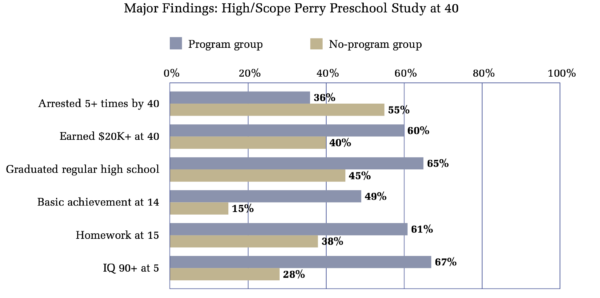Early childhood education unlocks future success
Early childhood education lays the foundation for lifelong learning and success. It shapes cognitive, social, and emotional development, creating a ripple effect that enhances future academic performance, career prospects, and overall well-being, proving to be a crucial investment in a child’s potential and society’s progress.
Early childhood education is an investment in society

The Chicago longitudinal study was initiated in 1986 and is still ongoing after 35 years. The study enrolled over 1500 children in government-funded kindergarten. These individuals have been followed over the years to assess the long-term effects of early childhood education. Key findings indicate that participants are more likely to achieve higher educational levels and exhibit fewer behavioural problems compared to their peers. The CLS highlighted the importance of consistent parent involvement and high-quality educational programs to promote positive behavioural outcomes. They also demonstrate better health outcomes and lower rates of criminal activity. Economically, the study suggests that every dollar invested in early education results in considerable savings in social services and increased earning potential. The study also has shown that children who participated in the CPC program had a 50% higher chance of becoming higher earners. Chicago Longitudinal Study underscores the value of early childhood education as a critical investment in the future of children and society.
Using active learning approach
The High/Scope Perry Preschool study is the longest longitudinal study in early childhood education. Experiment conducted from 1962 to 1967 in Michigan, to evaluate the effects of early childhood education on low-income African-American children. The study randomly assigned 123 children to either a high-quality preschool program or a control group with no preschool. The High/Scope Perry Preschool teaching model uses the active learning approach, where children can get hands-on experience, plan their activities, do them and then reflect. Teachers create a classroom environment supporting self-initiated learning, providing materials and activities stimulating children’s interests and development. Teachers role in the classroom is to guide and help, not to direct children’s activities.
The preschool group showed significant long-term advantages in various life outcomes. Project staff collected data annually on both groups from ages 3 through 11 and again at ages 14, 15, 19, 27, and 40. The study’s conclusions are profound, indicating that children who participated in The High/Scope Perry Preschool program offer benefits that extend well into adulthood, encompassing academic success, social and economic advancements, better family dynamics, improved health, and decreased crime rates.

Figure 1. Major Findings: High/Scope Perry Preschool Study at 40.
Better self-regulation skills
The Harvard Graduate School of Education researched early childhood education long term benefits. They did a study, which followed 466 children, tracking their academic performances and self-regulation skills until high school. The study emphasised professional development for teachers and a better learning environment for children, where they can be actively engaged in different activities. The study had two significant findings.
 They found a correlation between early math education and future academic success. Moreover, the study showed that children with early math skills tend to have better prosocial skills, like sharing, helping and cooperating with others. The study specifically focused on self regulation skills which are crucial to manage emotions, control impulses and orientate in social interactions. They aimed to improve children’s self-regulation skills through a comprehensive, classroom-based intervention. This included professional development for teachers to help them create structured and supportive learning environments that promote positive behaviour and emotional adjustment. Children who participated in the study demonstrated improvements in their ability to focus, control impulses, and manage stress. The project’s success highlights the importance of early interventions that go beyond academic skills and are important in further life.
They found a correlation between early math education and future academic success. Moreover, the study showed that children with early math skills tend to have better prosocial skills, like sharing, helping and cooperating with others. The study specifically focused on self regulation skills which are crucial to manage emotions, control impulses and orientate in social interactions. They aimed to improve children’s self-regulation skills through a comprehensive, classroom-based intervention. This included professional development for teachers to help them create structured and supportive learning environments that promote positive behaviour and emotional adjustment. Children who participated in the study demonstrated improvements in their ability to focus, control impulses, and manage stress. The project’s success highlights the importance of early interventions that go beyond academic skills and are important in further life.
Stronger parent-child relationships
The Carolina Abecedarian Project began in 1972 and involved 111 infants. The study’s innovative approach involved providing high-quality, full-time educational care from infancy through the first five years of life. Follow-up studies took place until the age of 35. The Carolina Abecedarian Project (CAP) significantly impacted family dynamics. Early childhood education fostered stronger parent-child relationships, as parents learned effective communication and engagement strategies through the program. This early intervention enriched the home learning environment, promoting positive interactions and enhancing the overall family unit. The CAP’s support helped parents become proactive in their children’s educational development, leading to improved outcomes for both children and parents. These findings underscore the importance of early education in strengthening familial bonds and highlight the role of parental involvement in a child’s developmental success.
High quality early childhood education is key
Quality early childhood education is not just about academic learning; it’s about nurturing well-rounded individuals. It is vital for personal growth, shaping future learning and behavior. It boosts brain development, literacy, and cognitive skills during critical early years. It fosters social and emotional maturity, promoting lifelong success, adaptilibility and well-being in the future.
Resources:
- L. J. Schweinhart. The High/Scope Perry Preschool Study Through Age 40, https://image.highscope.org/wp-content/uploads/2018/11/16053615/perry-preschool-summary-40.pdf
- High Scope. For six decades the Perry Preschool Project has forever changed the trajectory of early education, https://highscope.org/perry-preschool-project/
- Harvad Graduate School of Education. (2019). Lasting Gains from Preschool, https://www.gse.harvard.edu/ideas/usable-knowledge/19/08/lasting-gains-preschool
- Ostrander, M. (2015). How Preschool Can Make You Smarter and Healthier, https://www.pbs.org/wgbh/nova/article/science-of-preschool/
- Social Programs That Work Review. (updated 2017). Evidence Summary for the Abecedarian Project, https://evidencebasedprograms.org/document/abecedarian-project-evidence-summary/
- Society for Research in Child Development. (2019). Early improvements in preschoolers’ skills help explain long-term benefits of intervention, https://www.eurekalert.org/news-releases/869568
- Georgia Family Connection Partnership. (2021). Long-term Effects of Early Childhood Education: Beyond Academics, https://gafcp.org/2021/12/16/long-term-effects-of-early-childhood-education-beyond-academics/#:~:text=Adults%20who%20had%20quality%20early,positive%20relationships%20with%20family%20members
- Sullivan, L.M. (updated 2020). Chicago Longitudinal Study, https://clstudy.org/

